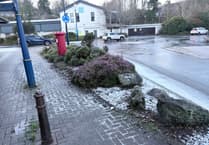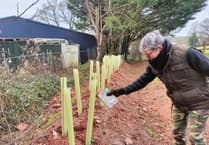DARTMOOR Forest Parish Council has scrapped plans to take part in a government scheme that helps rural communities develop energy projects.
The scheme was bought to the attention of the parish by Councillor David Worth, when he spoke of Buckland Monachorum Parish Council and its ongoing effort to increase the usage of renewable power in the area.
The funding, available from the government via the Rural Community Energy Fund, enables parish councils to employ consultancy firms to carry out surveys, liaise with stakeholders and seek advice form eligible legal entities.
The £15-million initiative is being jointly funded by the Department for Environment, Food and Rural Affairs (DEFRA) and the Department of Energy and Climate Change (DECC).
Only a small number of bodies are eligible to apply for the grants, including parish councils, community interest companies, charities and development trusts.
If the parish proceeded with the scheme, the installations would have been funded by a system in which investors buy bonds with the expectation of a return on their investment.
Despite discussing the scheme at length in the last two parish meetings, a final decision was deferred until all councillors had the opportunity to reflect on the opportunity.
In last week’s meeting, after a short discussion, councillors agreed the constraints on energy development on the moor provided little credible scope for a viable community scheme and hence a survey by professional consultants would be poor value for public money.
The parish council resolved not to proceed with a community energy feasibility study.
Nigel Tigwell, Dartmoor Forest Parish Clerk said: ‘It was a unanimous decision in an open forum. Fundamentally people’s expectations of the planning process on the moor is that anyone trying to put up solar panels or things like wind turbines will get a very rough ride. The only ones that get through are in places without a mains line.
‘Planners want the wind turbines close to trees so that they aren’t visible but then they would be sheltered and not getting enough wind, so ideally you would want them on top of a hill.
‘Lobby groups have been incredibly negative towards energy plans. There was a proposal for a hydroelectric system in Horrorbridge, they had a massive rough ride and once all the alterations, suggested by the environmental lobbyists, had been met, it wasn’t financially viable any longer.’
He added: ‘The council and individuals have already investigated their own farms but in these projects the Duchy takes half of the proceeds, meaning the profit is marginal.
‘The council were sceptical about whether we would be able to run a positive energy scheme. We have a phenomenal proportion of social housing so if people can’t afford to pay their rent they won’t be able to buy bonds in the energy scheme.
‘We decided that carrying out the surveys wouldn’t be a good use of tax payers’ money. It wasn’t that people don’t want green energy, people didn’t think we would be able to run a scheme at this time.’




Comments
This article has no comments yet. Be the first to leave a comment.